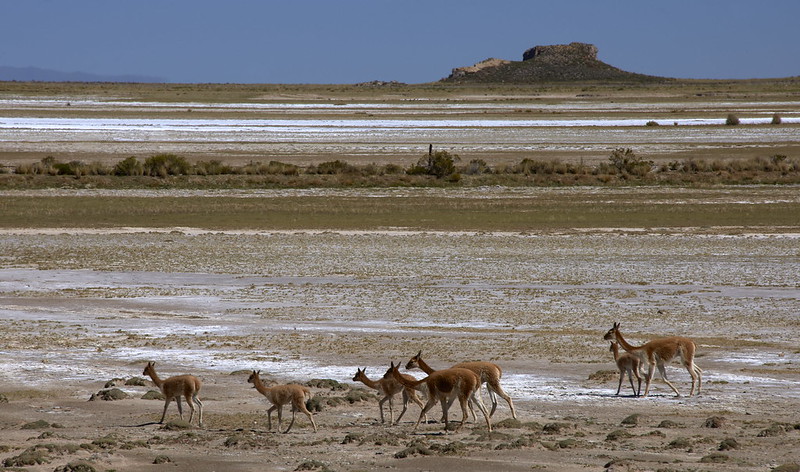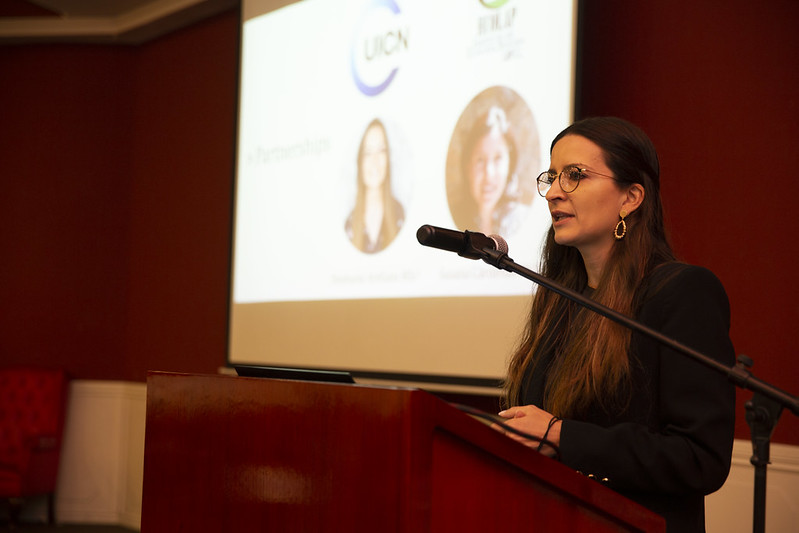Corporate disclosures related to nature lagging far behind climate
Gland, 5 November 2021 (IUCN) - New analysis from CDP and the IUCN suggests that companies are failing to adequately recognize and take action on risks posed from nature in their environmental plans and strategies, with an overwhelming focus on climate.

Photo: Marius Dobilas
- Less than 1% of disclosing companies are reporting nature-related risks, compared to 97% of those reporting risks related to climate, analysis from CDP’s 2020 climate change, water security and forests questionnaires shows. Whilst some companies are making progress on recognizing water, and to some extent forest risks, wider nature-related risks are going unrecognized.
- Of the disclosing companies identifying climate and nature-related opportunities, only 15% identify nature-related opportunities compared to 66% identifying climate-related opportunities.
- While 71% of disclosing companies reported climate and nature-related detrimental impacts, only 6.5% were related to nature, compared to 69% related to climate.
- Of those disclosing companies that reported undertaking responses to address identified detrimental impacts, only 11% reported nature-related responses.
The joint report, Disclosing nature’s potential: corporate responses and the need for greater ambition found that despite more than half of global GDP ($44tn of economic value generation) being dependent on nature and its services, less than 1% (0.5%) of 2,973 companies disclosing their environmental data to CDP in 2020 identified nature-related risks. This is compared to 97% of these companies identifying risks related to climate. Risks on nature include ecosystem vulnerability, with risks on climate including rising temperatures and extreme weather events.
Science has made clear that addressing the climate crisis cannot be achieved without simultaneously addressing the nature crisis in an equitable way. By 2050, the world must reach net-zero emissions and stop and reverse nature loss to keep the world on an environmentally sustainable pathway. These latest findings by CDP and the IUCN suggest that companies are falling far short of the action needed to limit these potentially irreversible impacts. 71% of 318 companies identified detrimental impacts from climate and nature-. But compared to 69% of responses reporting climate-related detrimental impacts, only 6.5% reported nature-related detrimental impacts. Furthermore, among those disclosing companies that reported taking responses to address these impacts, only 11% report nature-related responses.
Companies are missing opportunities
According to the World Economic Forum, there is a potential annual business opportunity of $3.5 trillion by 2030 associated with transitions towards a nature-positive economy in the food, land and ocean-use sector alone, including forest restoration, sustainable aquaculture and plant-based meat alternatives. However, this is an area of massive untapped potential. CDP and the IUCN found that only 15% of 810 disclosing companies reporting opportunities, report nature-related opportunities.
Pietro Bertazzi, Global Director of Policy Engagement and External Affairs at CDP said: “Today’s report shows that despite the increasing pressure on companies – from governments, investors and consumers – the majority are still not doing enough to minimize the adverse effects of their operations on the natural world or to protect their own activity from the risks facing them. Companies can expect regulation in the near future, as more governments move closer towards mandatory disclosure regimes that incorporate more than climate. It’s increasingly acknowledged climate crisis cannot be tackled without addressing nature and we see clear signs that environmental risk and opportunities will dominate the markets of the near future. So, it’s essential that companies plan around this to survive and thrive. This report gives them the basis to do so, and to get ahead of any future regulation by setting targets, and tracking progress by disclosing through CDP.”
Stewart Maginnis, Deputy Director General (Programme) at IUCN said: "Corporates need to face that fact that “Business as usual” is no longer a credible operational approach, neither for our planet nor for their bottom line. While there is growing recognition among some companies, too many still are not aware of the degree their operations impact, or are impacted by, nature loss. This report highlights that even among responsible companies, there is an urgent need to more fully embrace nature-positive business models”.
Contact
IUCN Press Office, press@iucn.org
Methodology & data source
This analysis was generated using data from 9,617 company responses to selected questions in CDP’s 2020 climate change, water security and forest questionnaires. The selection of questions and data points was based on the insights they could provide on how companies approach nature.
It was not feasible to analyse the tens of thousands of free text response fields in CDP’s data set, so this report presents an analysis based on pre-defined dropdown options in the questionnaire. Moreover, the responses provided by the disclosing companies may have also been constrained by the design of the different questionnaires and the options provided under them.
ABOUT CDP
CDP is a global non-profit that runs the world’s environmental disclosure system for companies, cities, states and regions. Founded in 2000 and working with more than 590 investors with over $110 trillion in assets, CDP pioneered using capital markets and corporate procurement to motivate companies to disclose their environmental impacts, and to reduce greenhouse gas emissions, safeguard water resources and protect forests. Over 14,000 organizations around the world disclosed data through CDP in 2021, including more than 13,000 companies worth over 64% of global market capitalization, and over 1,100 cities, states and regions. Fully TCFD aligned, CDP holds the largest environmental database in the world, and CDP scores are widely used to drive investment and procurement decisions towards a zero carbon, sustainable and resilient economy. CDP is a founding member of the Science Based Targets initiative, We Mean Business Coalition, The Investor Agenda and the Net Zero Asset Managers initiative. Visit cdp.net or follow us @CDP to find out more.
ABOUT IUCN
IUCN is a membership Union uniquely composed of both government and civil society organisations. It provides public, private and non-governmental organisations with the knowledge and tools that enable human progress, economic development and nature conservation to take place together.
Created in 1948, IUCN is now the world’s largest and most diverse environmental network, harnessing the knowledge, resources and reach of more than 1,500 Member organisations and some 18,000 experts. It is a leading provider of conservation data, assessments and analysis. Its broad membership enables IUCN to fill the role of incubator and trusted repository of best practices, tools and international standards.
IUCN provides a neutral space in which diverse stakeholders including governments, NGOs, scientists, businesses, local communities, indigenous peoples organisations and others can work together to forge and implement solutions to environmental challenges and achieve sustainable development.
Working with many partners and supporters, IUCN implements a large and diverse portfolio of conservation projects worldwide. Combining the latest science with the traditional knowledge of local communities, these projects work to reverse habitat loss, restore ecosystems and improve people’s well-being.



